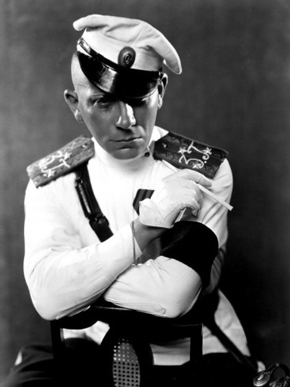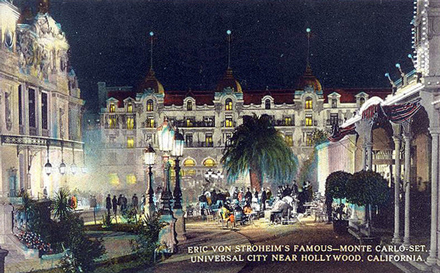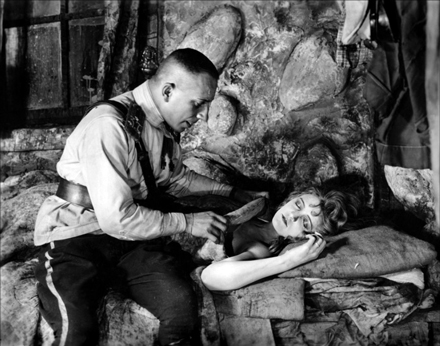
 |
|
|
|
Erich von Stroheim has been described as a legend and as a filmmaker before his time, neither of which quite does him justice. He was the biggest silent director ever to buck the system, to try to bend it to the will of the film artist. Almost always at war with the moguls that controlled production, he was a bigger than life, all-controlling perfectionist. Shooting schedules and budgets were trifles compared to his goal of glorious film art. He was the kind of director Hollywood by and large decided it could do without. The tragedy is that none of his surviving films can be said to be full and unmolested director's versions. 
Kino's new Blu-ray of von Stroheim's 1922 masterpiece Foolish Wives is no exception. Call it ambition, artistic determination or pure hubris, the director would not be limited by petty things like the practicality of distribution and exhibition.�The film was originally 32 reels and von Stroheim wanted it shown in two 3-hour parts at two separate theaters in each town. When von Stroheim realized that it had to be cut down, he wanted to do it himself. Thalberg hired Ripley and locked the director out of the editing room. Reduced by half -- three hours -- it reportedly premiered well. But the censors then became incensed about scenes they wanted taken out, including an 11th-hour development in which a premature baby was born. The film became twelve reels for the road show run, and then ten for general release. It was later cut even further by Universal. Fifty years later in 1972 the American Film Institute restored it almost to the seven-reel 143-minute version. The amazing thing is that the movie plays very smoothly. Von Stroheim's superb direction seems far beyond what one would expect to see in 1922. The characters have psychological depth. We learn about them mostly through their behaviors, not expository inter-titles. Von Stroheim's story plays off his familiar "Man You Loved to Hate" persona, which first surfaced when he portrayed grossly inhuman Germans in WW1 propaganda melodramas. This time out he is the phony Count Sergius Karamzin, a Russian who likes to pose in full military uniform. With his 'cousins' Olga and Vera (Maude George & Mae Busch) Sergius has rented the Villa Amarosa in Monte Carlo as a base to fleece unwary rich tourists. Wholly decadent con artists, the trio takes their profession as a lark, to be enjoyed as long as it lasts. They buy counterfeit francs from Ventucci, a local forger (Cesare Gravina). The perverse Sergius instantly forms a prurient attraction to Marietta, Ventucci's mentally challenged daughter (Malvine Polo). That complicates things. He has already promised his maid Maruschka (Dale Fuller) that he will marry her, and his new scheme requires that he seduce Helen (Miss Dupont), the wife of Andrew Hughes (Rudolph Christians), the new American Consul to Monaco. Using his imposing good manners, Sergius takes advantage of Helen's inexperience to offer to 'protect' her from local charlatans. He and his cousins are soon accompanying the Hughes' on outings in public. Sergius' first major move comes when he maneuvers Helen alone into the woods as a storm approaches. Just as planned, they're forced to spend the night together in a shack, but Sergius' amorous aim is thwarted when a Monk arrives in need of shelter. Back in Monte Carlo, Sergius goes to see Marietta, but Ventucci warns him that he will kill any man that harms his daughter. Frustrated, he finally makes his big move on a casino night. After joking with Helen's trusting husband, Sergius goads Helen into risking a fortune at the roulette wheel. When she wins, he lures her to the Villa and convinces her to let him have it all. Vera and Olga keep Andrew occupied as best they can, but Sergius hasn't taken Maruschka's feelings into account -- or what she'll do when she sees him with Helen. Many artistic feature films from the 'teens and early 'twenties exhibit glorious photography and creative, innovative storytelling strategies. The only factor inhibiting our full appreciation is the availability of quality film prints. Foolish Wives is a superior example because it combines artistic sensibilities with an adult theme and characters uncompromised by commercial considerations. It hasn't dated, really. It takes place among rich Europeans just after WW1, which is when it was written and filmed. Erich von Stroheim's gigantic production is impressively modern. The interiors and exteriors look real at all times, and the camera angles never simply display the action. We see high and low angles and combinations of shots that give locations depth and personality. In 1922 the movie probably imparted a "you are there" feeling to its audience. The reveal of the enormous Monte Carlo plaza displays a huge crowd of carefully costumed extras and a troop of mounted cavalry. This street action is seen in background of intimate shots, and is reflected in windows. Cameramen William Daniels and Ben Reynolds don't simply combine master shots with idealized close-ups -- the camera unerringly finds an expressive angle. Close shots are saved for dramatic moments or to emphasize specific reactions. Foolish Wives even confects convincing night-for night scenes, lighting the casino front as dozens of boats with lanterns cruise in the harbor. Perhaps von Stroheim did waste money on invisible things like silk underwear for his actors, but the movie looks every bit of its gigantic budget. Von Stroheim makes his cultured Sergius Karamzin character a slime ball second to none. Sergius plays the suffering martyr to get what he wants from women, and secretly sneers and chuckles when they buy into his lies. When the Consul sees that he's giving something to Helen, Sergius defuses his suspicion by joking that it's a love note... which it is. Going to outrageous lengths to drag Helen out to a leaky cottage in a storm, Sergius uses a mirror to peek at her as she undresses -- and then bats a goat's hind end away from his face. The writer-director frequently undercuts Sergius with visual jokes of this kind. Karamzin boasts of his military career but when another man calls his bluff, he's unmasked as a cheap coward. 
Von Stroheim's attention to detail creates many impressive moments. When Sergius first meets Helen, he plays up his supposed chivalry by retrieving a fallen book for her. He sneers at an American officer sitting nearby, who doesn't move to pick it up. Helen accepts Sergius' assertion that Americans have no manners. In the film's final act Helen is exiting her hotel when she sees this same American officer standing stiffly, with his cape fallen at his feet. She at first frowns, and then realizes that the man's sleeves are empty -- he couldn't pick up the book earlier because he's an armless casualty of the war. Helen tenderly picks up the officer's cape and caresses him as she offers her apology. In the final act of Foolish Wives, the preening Sergius shrinks in stature, while the supposedly silly or stuffy people he preys upon are shown to possess worthy values. The acting is on an unusually high level. "Miss Dupont" is the stage name of an actress named Patricia Hannan. Many '20s actors affected elite or continental-sounding names for film work, and von Stroheim of course encouraged the illusion of an aristocratic heritage. Maude George and Mae Busch play an interesting pair of troublemakers. Olga reminds Sergius that their goal is money, not sexual conquest, a lesson that he never learns. When the authorities show up Vera takes it all in stride. Prison is a place she's clearly known before. The knave Sergius stays true to his vices to the bitter end. A stylized screen texture is used to represent his subjective "lust" point of view; it's used when he regards both Marietta and Helen. When all of his twisted plans have fallen through Sergius still has rape on his mind, and he pays dearly for his urge. Von Stroheim lets his villain begin by eating caviar for breakfast, but he finishes in the most ignominious manner possible. Foolish Wives was known as the first Million Dollar Movie, which was a promotional stunt that Universal's Carl Laemmle started long before the film's finish. It was originally budgeted at a quarter of that amount, before von Stroheim took charge. The enormous Monte Carlo casino exterior, more of a replica than a set, in itself reportedly cost almost half a million, although publicized numbers were exaggerated by Universal. Von Stroheim did run wildly over budget, basically ignoring his agreement with Laemmle and shooting a prodigious amount of film. When the 'boy wonder' Irving Thalberg tried to remove the director, von Stroheim reminded him that he'd quit as an actor as well. It's the kind of artistic blackmail that only works once. If von Stroheim acted so harshly it was surely because he felt that survival in the newborn Hollywood required having the upper hand; business as usual was that the studios dictated everything. Thalberg eventually won, of course, and the rest of the director's career would be a bitter losing struggle against the Hollywood powers. What remains are broken movies that suggest that von Stroheim was in a class of his own. 1 
Universal's editor on Foolish Wives' was Arthur Ripley, who worked with Frank Capra and much later directed the strange cult film Thunder Road with Robert Mitchum. He is also said to have founded the UCLA Film School. Von Stroheim's assistant was the talented Gustav Machatý, who later directed the Czech classic Ecstasy, the film that introduced Hedy Lamarr in notorious nude scenes. Kino Classics' Blu-ray of Foolish Wives is a fine encoding of a decent AFI restoration from 1972. I haven't seen earlier DVD releases of this title and have heard conflicting comparison reports -- some say it looks better but others complain that it isn't a major improvement. The Blu-ray remains a patchwork from multiple sources, so the visual quality frequently jumps, often within scenes. The soundtrack used is the original 1922 score by Sigmund Romberg, performed by Rodney Sauer. Most of the extras were on Kino's disc from ten years ago. The major item is still The Man You Loved to Hate, Patrick Montgomery's 90-minute overview of von Stroheim's life and career. The fascinating director began as a jack-of-all-trades for D.W. Griffith. Richard Koszarski provides the feature commentary and two brief interviews feature con Stroheim's wife Valerie, and the producer-agent Paul Kohner. A photo gallery is present as well. A brief overview of the petty last-minute cuts made by the New York Censor Board show how difficult it was to put anything resembling serious adult content into a movie back in 1922. Hollywood probably painted Europeans as decadent and perverse back then because denigrating them was one way to get racy exciting content into a movie. Interestingly, either a piece of film is still missing or it was cut by the censor - a few moments of Sergei Karamzin's final confrontation would seem to be missing.
On a scale of Excellent, Good, Fair, and Poor,
Foolish Wives Blu-ray rates:
Footnote:
1. I've heard the battle between von Stroheim and Universal invoked to describe later directors that chose, rightly or wrongly, to defy their own producers to follow their personal vision. This of course happens whenever a powerful director like David Lean decides to use his heft to get what he wants, when his producer would rather retain more fiscal control. The relative featherweight Sam Peckinpah must have been mad to think that he was strong enough to prevail over a studio dedicated to keeping renegade directors in line. Orson Welles never had a chance after he handed RKO a ton of controversy. They surely resented his first masterpiece and may have massacred his second just because they could, to prove their power over 'genius' upstarts. The only director who got away with this was Michael Cimino, at a time when his studio United Artists had neither the clout nor the courage to Just Say No to
Reviews on the Savant main site have additional credits information and are often updated and annotated with footnotes, reader input and graphics.
Review Staff | About DVD Talk | Newsletter Subscribe | Join DVD Talk Forum |
| ||||||||||||||||||